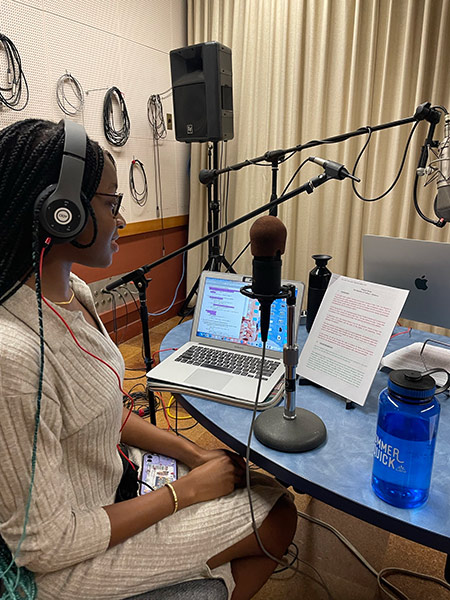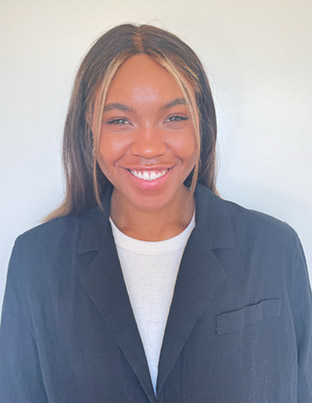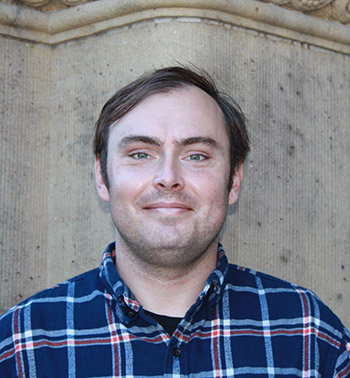By Andrew Cohen
In high school, art is widely viewed as a mental break from more rigorous courses. But in law school, art is more like a sensory-overload Jackson Pollock canvas — requiring students to unpack colorful, complicated, multi-layered issues.
Hot topics in art law are a passion for members of Art & Innovation Representation (AIR), one of the Berkeley Law Pro Bono Program’s newer Student-Initiated Legal Services Projects. With a new class of members this academic year and an ever-changing social media world, they wanted to find a medium that could fuel their wide-ranging interests and share them with a larger audience.

Enter the “Power of Pro Bono” podcast, a new outlet for those involved with Berkeley Law’s pro bono community. AIR recently launched the platform with its first three episodes, addressing music sampling, international restitution, and COVID-19’s impact on live theater.
“We wanted to ensure rigor and integrity, but at the same time make the podcasts easily understood by creatives who are trying to understand the various ways the law can affect their rights,” says AIR Co-Director Ross Moody ’23. “I think our members knocked it out of the park.”
The project required students to research a topic of interest that was both pressing and relevant in the art law world. They had to learn about the issues involved, find prominent experts in the field who could enrich the conversations, and edit the podcasts themselves.
Working with California Lawyers for the Arts, AIR members used their research to develop scripts and enlist a range of experts: Fordham School of Law lecturer Leila Amineddoleh, who has represented governments such as the Hellenic Republic of Greece and the Republic of Italy in high-profile restitution cases in recovering stolen art and cultural property; forensic musicologist Sandy Wilbur and intellectual property attorney Josh Schroeder; and Nevin Law Group founder Doug Nevin, counsel for Broadway and Off-Broadway plays.

“Music sampling came from a love of music and interest in the nuances of ownership that exist in a creative industry,” AIR Co-Director Stephanie Arrington ’23 says. “International restitution came from a conviction for the proper owners of distinguished art pieces, the role of museums across the world, and interest in the legislature-required to right generational wrongs. COVID’s impact on live theater came from a love for the performing arts and the new frontier that is the post-pandemic world.”
These episodes and the new pro bono podcast platform as a whole are welcome developments to Deborah Schlosberg, the director of Berkeley Law’s Pro Bono Program, “AIR was born out of Berkeley Law students’ passion for art and law,” she says. “The way that Stephanie and Ross took this passion and turned it into a pro bono community education effort through the podcast medium is such an extraordinary example of our students’ ingenuity. The Pro Bono Program sees the ‘Power of Pro Bono’ podcast as a vehicle for continued access to legal information for the community, and a way to highlight the importance of pro bono work within the legal profession.”
Spreading the word
AIR leaders hope their podcast helps reach more artistic creators who don’t realize the extent to which intellectual property law can protect their rights.
“I think artists and inventors aren’t aware of exactly how much of a deep dive into the creative process lawyers and judges take during the litigation of patent, trademark, and copyright claims,” Moody says. “Creatives understandably envision a situation in which a bunch of suits go into a courtroom and come out with a result that might as well be picked out of a hat, because the legal system is represented in mainstream culture as an entity that could care less about the nitty-gritty of creative processes.

“What I hope the podcasts and future work of our group does above all else is to get the message out to creatives that the law does, in fact, take into account the intellectual and technical intricacies of the various creative media through which they express themselves and fulfill their visions.”
Rather than groom regular hosts, eight students have already co-hosted an episode: Phillipe de Lathuy, Victoria Bankole, Brooke Henderson, Dallin Johnson, Plakshi Jain, Kalyn Adiekweh, Rainy Ren, and Shen-Min Chen. AIR aims to have as many of its students host as are interested.
Arrington’s vast podcast experience helped the group translate its creative vision into tangible reality. She and her college friend Jillian Newton co-host “Black Genzennials,” which offers candid conversations on issues of race, books, dating apps, and myriad other topics.
“As the world became more ready to address racial differences, we saw ourselves being put in boxes: ‘political activist,’ ‘token,’ ‘angry,’” Arrington says. “However proud we were to embrace the way the world saw us, we also struggled with the fact that we were so much more than that: ‘TikTokker,’ ‘astrology lover,’ ‘academic.’ We found two different things were defining our identities simultaneously: our race and the normal, everyday social influences around us. We were both Black and Genzennials, and we wanted to show that to the world.”
Now north of 60 episodes, the podcast is well into its second year. Arrington credits that process for learning how to make guests feel comfortable so they can best share their perspective, and for reinforcing that authenticity fosters the best discussion. It also helped her hone mechanical skills, such as pinpointing the proper music to use, picking the appropriate episode length, and deciding how to best “sign in” and “sign off.”
She and Moody both express appreciation for the collaborative nature of AIR’s new project: the all-in participation from California Lawyers for the Arts, the first few podcast guests, Berkeley Law’s Pro Bono Program, and the school’s podcast technical staff.
“I’m just humbled by the fact that we could come up with ideas we thought were interesting, and have all of these extremely intelligent and creative people be willing to help us realize our vision for these podcasts,” Moody says. “That’s been really gratifying.”